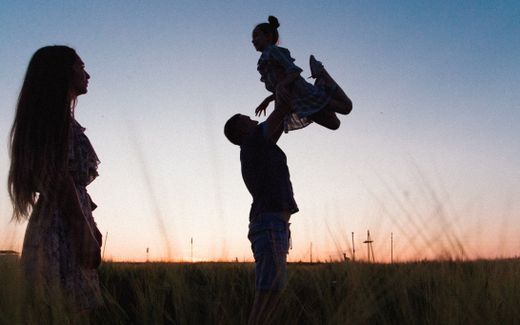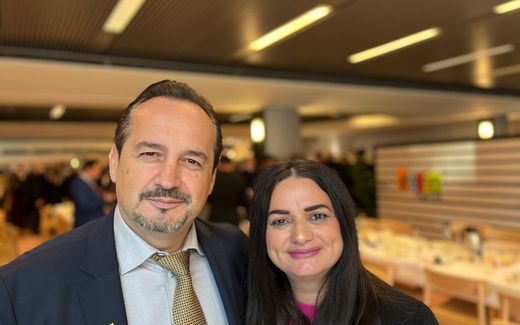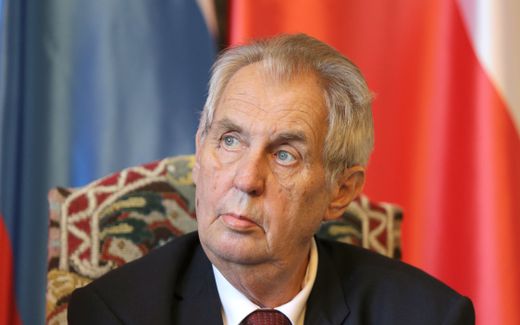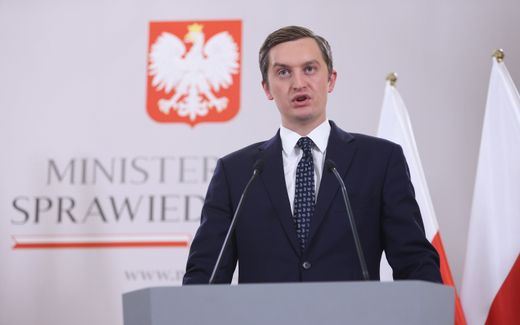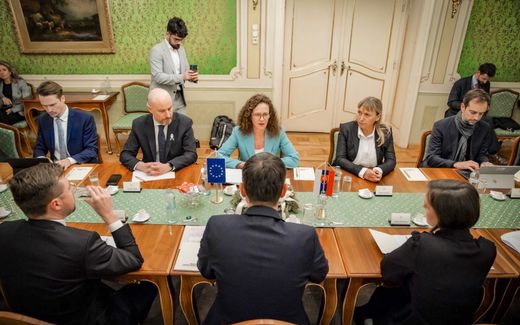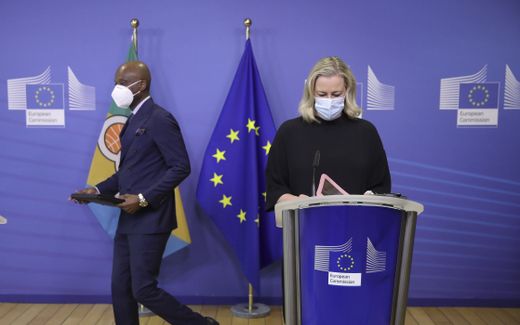Baby Sara pours oil on the fire of rainbow interests
04-03-2023
European Union
Cornelis Boon
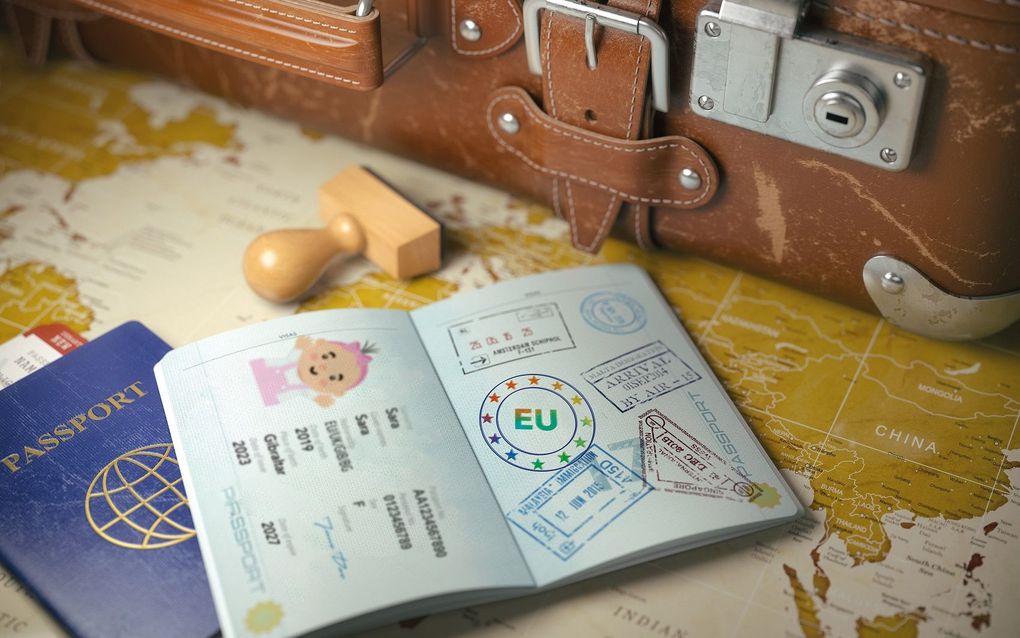
Some fear that the European Union uses the right to free movement to legalise gay marriage in all EU member states. Photo RD, iStock
European Union
If one member state recognises the parenthood of a gay couple, all member states must do so, the EU Court of Justice ruled in 2021. Is this one step to general acceptance of so-called rainbow families in the EU?
"This proves that the EU is a union of equality," cheered Arpi Avetisyan from the LGBT lobby group ILGA after the Court's verdict. Her organisation offered legal support in a court case brought by baby Sara's parents against Bulgaria. That country did not recognise Sara as their child because she had two mothers. That attitude violates EU law, the Court ruled.
Sara was born in 2019 to a lesbian couple. Her one mother is British but born in Gibraltar. Sara's other mother is Bulgarian. Her parents had lived in Spain since they married, where Sara was also born. Since neither mother had Spanish citizenship, Sara was not eligible for that either. She also could not claim British citizenship. English law states that a child of a Gibraltarian cannot become a British citizen.
Then we will go to Bulgaria, Sara's parents thought. To become a citizen there, only one of the parents must have been born in the country. The mothers applied for a birth certificate for Sara in the Bulgarian capital Sofia. They did not get one, as Bulgarian law states that you can only be registered if you have a father and a mother. Bulgaria also did not recognise a birth certificate from Spain. The result: Sara received no nationality and no passport. In addition, she could not leave Spain because she had no identity paper.
Free movement
Sara's parents appealed the decision to the Court in Bulgaria's capital Sofia. It asked the EU Court of Justice for advice on this sensitive issue in late 2020.
The answer came in December 2021. According to the Court, the Sofia municipality's decision was unfounded. Admittedly, EU law does not oblige Bulgaria to recognise the parenthood of Sara's mothers. But because of the free movement of persons, the right for EU citizens to move to and reside in every member state, Bulgaria was not allowed to refuse Sara citizenship. Moreover, children in the EU have rights that the government cannot restrict. EU law even recognises that two men or women can also have a child.
"Free movement never meant to establish parenthood of gay people"
"Incorrect," Laetitia Pouliquen assesses the European Court's ruling that Bulgaria must recognise baby Sara as the child of two mothers.
Pouliquen is the director of Europe for Family, a legal organisation that advocates the father-mother-child family in the EU. "Previously, a spouse was understood to be only a man and a woman. Only in 2018, the Court ruled that the term includes people of the same sex."
Moreover, she thinks it is a far-fetched argument by the Court that Bulgaria hinders Sara's free movement of persons. "Free movement was never meant to establish parenthood of gay people EU-wide," she said. Concerned is Pouliquen about the proposal to force countries, through a certificate, to recognise the status of families with two fathers or mothers when they move.
"I fear that gays in countries where they are not allowed to marry will circumvent the law by marrying in countries where it is allowed. If they have a child and move back, the certificate requires their home country to recognise the marriage."
Following the court ruling, the Sofia court in May 2022 obliged the authorities to issue a birth certificate to Sara with her mothers' names. The Sofia authorities appealed that decision to the National Supreme Court in late 2022. That decided on March 1 that the case could not be heard because Sara does not have Bulgarian nationality. This decision cannot be appealed. LGBTI organisations are furious. They say this is only the beginning of the fight.
The EU Court of Justice has followed up on baby Sara's case. In June 2022, the Court ruled the same in a similar case in Poland: "Every EU country must recognise the civil status that people in another member state have."
LGBT strategy
The judgment is not a step towards getting same-sex marriage legally recognised across the EU, the Court argues. It is about unhindered freedom of movement, according to the Court. Still, countries like Bulgaria fear the ruling may force them to recognise same-sex marriage through EU law. Many southern and eastern European countries do not allow people of the same sex to marry. But if those member states must recognise that 'rainbow families' form a family, they must also accept same-sex marriage, is the thinking.
These fears are not unfounded. In recent years, there has been a trend within the EU institutions to promote the acceptance of rainbow families in member states. The European Commission, which initiates legislation within the EU, installed a European Commissioner for Gender Equality in late 2019. An LGBT equality subgroup was set up in the Commission in 2020.
But the core document to promote the acceptance of gays, lesbians and trans people at the European level is the LGBT strategy 2020-2025. "The Commission is committed to tackling discrimination against LGBT people," Commission President Ursula von der Leyen spoke at its presentation in 2020.
Competence
In its LGBT strategy, the Commission says it will use legislation to "push for mutual recognition of family relationships in the EU. If someone is a parent in one country, his or her parenthood is valid in all countries." To make that happen, the Commission proposed introducing a European parental certificate in late 2022.
Member states will thus be obliged to recognise each other's parenthood, which is precisely what countries like Bulgaria fear. If a Dutch rainbow family with children moves to Bulgaria, the authorities there must recognise that the same-sex partners are parents and form a family. This does not force countries to legalise same-sex marriage, the Commission says in its LGBT strategy: "That is a Member State competence. EU law only applies to cross-border cases."
The European Council and Parliament have yet to consider the Commission's proposal. There, it faces strong opposition from politicians from southern and eastern Europe, where traditional family values are highly valued. They see the proposal as a first step to take away member states' control over family policy and promote acceptance of LGBT people in the EU.
What do MEPS think about LGBT developments in politics?
Catharina Rinzema, a Dutch liberal MEP, highly values European norms, such as that it should not matter where an EU citizen was born. He or she should have the same rights everywhere in the Union, she argues. It is in this light that she sees the issue of baby Sara. "Everyone has the right to a birth certificate, no matter what their parents do," she said. She calls the Commission's ruling a marker for rainbow family rights.
Vera Tax, MEP for the Labour Party, agrees. "An EU citizen should not lose his rights if he moves across borders," she said. She refers to EU law that guarantees EU citizens free movement between member states. Children also have the right not to be separated from their parents. Baby Sara should therefore be able to travel to Bulgaria with her parents. Consequently, she should be given a passport as well as receive nationality from Bulgaria, even though it does not recognise the parenthood of two mothers.
Rinzema and Tax are both members of the Intergroup on LGBT rights, a forum for MEPs working for the rights of the queer community. Members often base their proposals on sexual minority rights.
Undermining
Ladislav Ilcic, MEP from Croatia, is sceptical about the European Court's decision. According to Ilcic, a member of the European Conservatives and Reformers (ECR), it undermines national legislation. "Now the EU wants Bulgaria to take over parenthood from Spain. The next step is for Bulgaria itself to recognise parenthood for gay couples."
Dutch SGP MEP Bert-Jan Ruissen also thinks the Commission's plan undermines the power of member states to determine family law themselves. "Now they say it only concerns cross-border issues with same-sex parents, but I fear that over time it will become a norm that all EU countries have to abide by", Ruissen, a member of the conservative Reformed SGP party, says.
Ruissen points out that the rule creates inequality. "It means Bulgaria has to recognise same-sex marriages of people from abroad, but not those of people in its own country."
Catharina Rinzema calls fears that the EU is using the right to free movement in the Union to introduce progressive rainbow policies unfounded. "Baby Sara's case is only about a right that all children have. That is stated in the European Charter of Human Rights."
For the Croatian Ilcic, those reassurances are not enough. "Gender ideology today is a European value that is treated as a right," he says.
Ruissen also holds onto his point. "In practice, the most progressive country becomes the leader in this field. If a member state were to recognise polygamy, a parental certificate obliges all member states to recognise such a family if it comes to live there."
Rinzema acknowledges the tension between EU cooperation and the sovereignty of member states. However, she points out that Europe has clear rules. "Anyone who wants to become a member must abide by them. If you don't, the European Court judges whether you are in breach."
Vera Tax does not see baby Sara's precedent as violating the principle of subsidiarity, which determines who makes what legislation: the EU or the member states. "EU legislation serves different purposes than national ones. The EU will never make a law it does not have the competence to make, so no compulsory EU family law either."
She does not believe that the ruling in the Baby Sara case is a means to introduce same-sex marriage are unjustified. "The Union only offers a solution for children who fall between the lines," she said.
Related Articles

